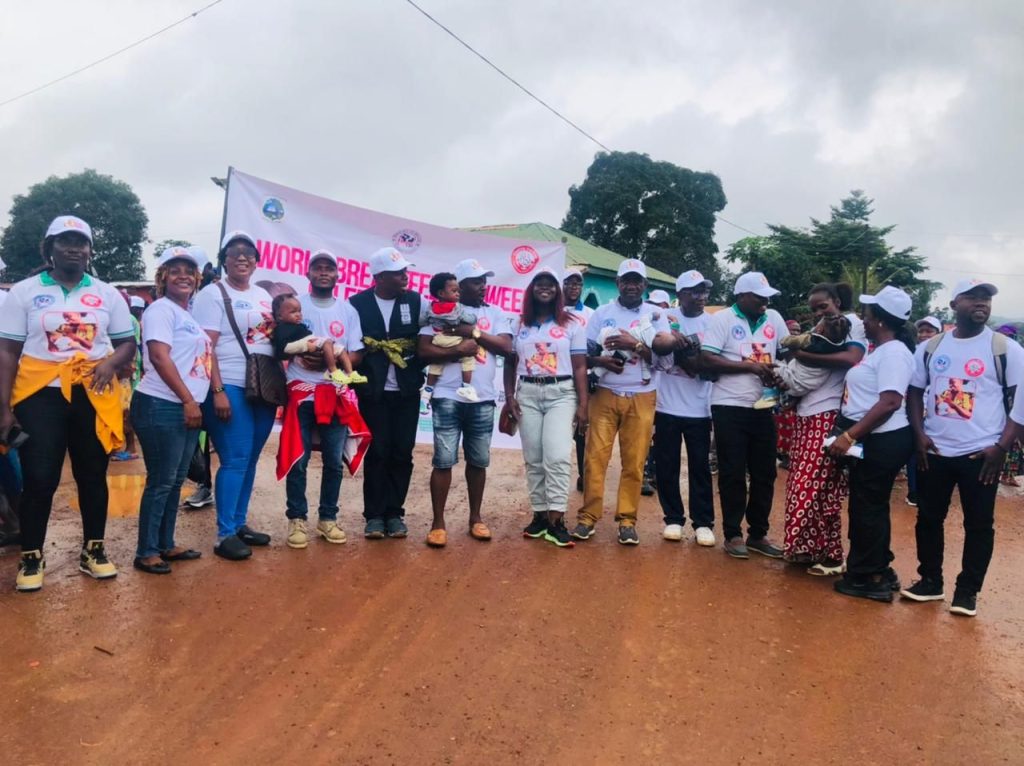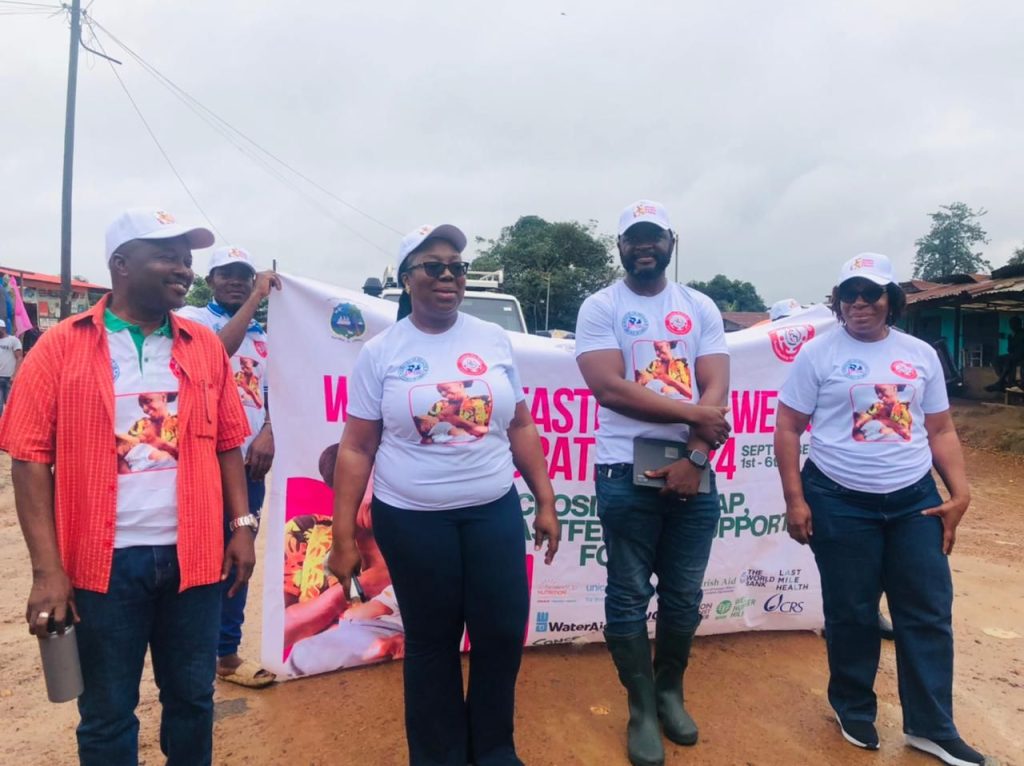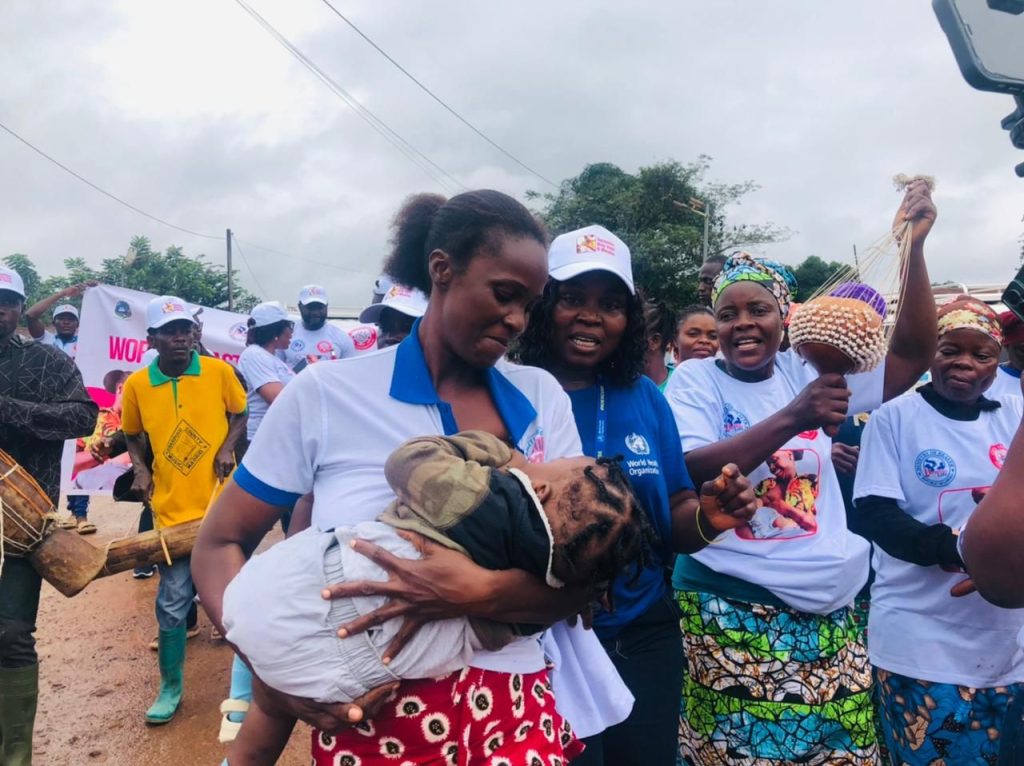Gbarpolu County:
(September 6, 2024)The government of Liberia through the Ministry of Health (MOH) in collaboration with World Bank, World Health Organization (WHO), UNICEF, and several other partners on Friday, September 6, 2024, jointly observed the World Breastfeeding Week at the Bapolu City Hall in Bopolu City, Gbarpolu County.
World Breastfeeding Week is a global campaign held in the first week of August each year to break gaps in breastfeeding globally and raise awareness on the importance of baby mothers’ breastfeeding, this year breastfeeding week celebration was held under the Theme: “Closing The Gap: Breastfeeding Support For All.”
The event kick-off officially with a grand parade in the streets of Bopolu to the City Hall and concluded at the Emirates Hospital where a breastfeeding room was officially launched for the first time for working mothers who will take their babies to work after maternity leave to continue exclusive breastfeeding up to six months of the baby’s life.

Gathering key stakeholders, donor partners and motherly figures, the event also highlighted key roles fathers must play during the process of breastfeeding so as to help mothers comfortably breastfeed their new born without stigmatization.
Speaking at the event, the Chief Medical Officer of Liberia, Dr. Catherine T. Cooper applauded mothers across the country for being supportive in promoting breastfeeding, and also emphasized the importance of breast milk in the lives of babies.
“We came to reemphasize the importance of breastfeeding and we call on mothers to continue breastfeeding their babies, we encourage you to also spread the message to other mothers to embrace the Mother Nature,” Dr. Cooper noted.
Also addressing participants at the launch was Dr. Calluas Howe, Assistant Minister for Preventative Services at the Ministry of Health.
At the same time, Dr. Howe expressed the need for mothers to breastfeed their babies, adding that it remained central to the survival of women, children and the public in general.
“Despite the progress being made by government and partners to improve maternal and child nutrition in the country, one- third of our children continue to suffer from chronic malnutrition and hidden hunger that affect their growth and development, therefore we have come to encourage all mothers to practice exclusive breastfeeding up to six months of the child’s life to help our children live a long-lasting healthy life, and not only the babies benefit but also the mothers,” Dr. Howe emphasized.
Dr. Howe expressed worry over the gradual decline in exclusive breastfeeding and assured that the Ministry of Health will work closely with key health partners including, the World Health Organization (WHO) and UNICEF with a focus on informing people about the importance of protecting breastfeeding.

Also speaking, the Director of Nutrition Division at the Ministry of Health Dr. Bedee Duworko Gbozee, underlined the importance of Breastfeeding, stating that it protects babies against some short- and long term illnesses and diseases, lower risk of asthma, obesity, type1 diabetes, and sudden infant death syndrome.
She said breastfeeding prevents babies from also having infections or germs and babies that are breastfed clearly grow healthy and strong.
“Breast milk is available at anytime and anywhere, is always clean, nutritious and at the right temperature, it stimulates the bond between mother and baby,” Dr. Gbozee said.
Dr. Gbozee called on the public to “support mothers to breastfeed anytime, anywhere,” especially at workplaces so that it is normalized and not criticized in public.
In addition, the Director of Nutrition said the Ministry of Health also aims to recognize breastfeeding mothers this year, ensuring they are seen and heard, and share relatable human experience about breastfeeding and the importance of multi-level support.
“This year we want to really recognize breastfeeding mothers, ensure they are seen and heard, and share relatable human experience about breastfeeding and the importance of multi-level support, these multi-level support includes, policies and attitudes that value women and breastfeeding, a women and breastfeeding-friendly healthcare system, respect for women’s autonomy and her right to breastfeed anytime, anywhere, solidarity and community support” she noted.
Madam Kluba Mensco and Angeline Gaflo were among five mothers who received token of appreciation during the event for practicing exclusive breastfeeding, the two mothers call on their counterparts to also practice breastfeeding, to enable their babies stay healthy.
“Many of our friends stop breastfeeding their babies at three months, for me, I always give my baby Tata from zero to two years and it helps to keep my children strong and health, so Tata water is very good and all mothers should give their baby Tata” said Angeline Gaflor as she share her story of breastfeeding.
Kluba Mensco also shared her story: “When I was pregnant, doctors always advised me to give my baby Tata from zero to six months after giving birth, I follow the advice and after giving birth I started giving my baby Tata, now my baby one year old and he strong and big like two year old child, it also help me by serving as family planning and cut down expensive for me” Kluba noted
Meanwhile, the Ministry of Health through its Nutrition Division used the occasion to unveil a mini breastfeeding and nursing room at the Emirates Hospital for employees of the hospital.
Nationally celebrated at the Bopolu City Hall in Bopolu City, Gbarpolu County, some activities befitting the event initially began nationwide with a massive awareness, including breastfeeding messages airing and hosting of Talk shows, aimed at educating and encouraging babies’ mothers on the importance of breastfeeding, and the necessity of exclusive breastfeeding their babies up to six months after birth.

Breastfeeding also called nursing, is the process of feeding a mother’s breast milk to her infant and is the best way to provide infants with all the nutrients it needs.
The week celebrates breastfeeding mothers in all their diversity, throughout their breastfeeding journeys, and showcases the ways families, societies, communities and health workers can have the back of every breastfeeding mothers



